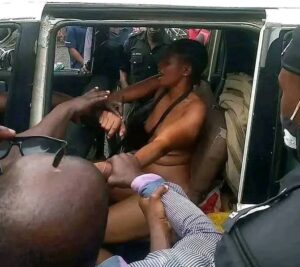Benue State Imposes 10 PM Curfew on Public Events
Benue State Imposes 10 PM Curfew on Public Events
In Benue State, new regulations have been implemented, making it illegal to hold wakes or other public events beyond 10 PM.
Additionally, the state has banned farming on unfenced vacant lots in front of any premises, along streets, or beside roads in urban areas. This prohibition extends to undeveloped government office areas, reserved lands, and conducting rallies after 10 PM.
Governor Hyacinth Alia formalized these measures by signing an executive order to establish the Department of Public Order within the Ministry of Justice, aimed at overseeing policies related to public order.
Governor Alia explained that these steps are necessary to combat rising criminal activities and political violence, including kidnappings, murders, and intimidation, which have fostered the emergence of local warlords and militia groups.
During the signing ceremony at the Government House in Makurdi, Alia, represented by Deputy Governor Sam Odeh, highlighted that the order is in accordance with Section 14, Sub-section 2 of the 1999 Constitution and Section 10 of the Public Order Act, CAP 382.
The governor emphasized the need for strict compliance with the new laws, which prohibit various activities deemed detrimental to public order. These include violations of traffic rules, child labor, prostitution, illegal waste disposal, open defecation and urination, demanding levies from developers, and erecting structures on water channels or public paths.
Specifically, farming on unfenced plots, on streets, or in front of premises in urban areas is banned, as is farming on undeveloped government land. Public gatherings, including wakes and rallies, must conclude by 10 PM.
Violations of these regulations will result in fines ranging from N20,000 to N500,000 or imprisonment, depending on the severity of the offense. However, those wishing to hold events past the curfew can apply for a permit from the Department of Public Order.
The governor also announced the formation of a Public Order Advisory Committee to guide the government on maintaining public safety and order. A corresponding committee will operate in each local government area, working with the advisory committee and other stakeholders to enforce these laws.
TRENDING SONGS
 Wedding Called Off: How Lady Cancels Wedding After Finding Out Finance’s Affairs With Her Bestie
Wedding Called Off: How Lady Cancels Wedding After Finding Out Finance’s Affairs With Her Bestie
 Heartbreak in Ikeja: Lady Weeps After Fufu Found in New Phone Package
Heartbreak in Ikeja: Lady Weeps After Fufu Found in New Phone Package
 Twist of Fate: Man Who Questioned Phyna’s ₦1Billion Demand Mourns Brother in Dangote Truck Crash
Twist of Fate: Man Who Questioned Phyna’s ₦1Billion Demand Mourns Brother in Dangote Truck Crash
 Tragedy in Enugu: Dangote Truck Claims Lives of Family of Five
Tragedy in Enugu: Dangote Truck Claims Lives of Family of Five
 Bangkok Crackdown: Nigerian-Thai Couple in Police Net Over Drug Trafficking
Bangkok Crackdown: Nigerian-Thai Couple in Police Net Over Drug Trafficking
 Family Rift: Reno Omokri’s Ex-Wife Says He Deserted Their Special Needs Son
Family Rift: Reno Omokri’s Ex-Wife Says He Deserted Their Special Needs Son
 The Man Who Sent Money for Two Decades, Only to Return to an Empty Shell
The Man Who Sent Money for Two Decades, Only to Return to an Empty Shell
 See how a young lady was beaten in a village and naked for stealing a goat
See how a young lady was beaten in a village and naked for stealing a goat
 See How Man That Plans to Divorce His Wife, Gets Shocked When She Leaves Him First With Their 5 Kids
See How Man That Plans to Divorce His Wife, Gets Shocked When She Leaves Him First With Their 5 Kids
 Tragic Land Dispute: Man Kills Father in Imo, Pastor Arrested for Rape
Tragic Land Dispute: Man Kills Father in Imo, Pastor Arrested for Rape
Share this post with your friends on ![]()













